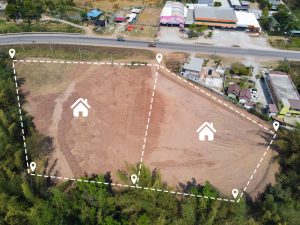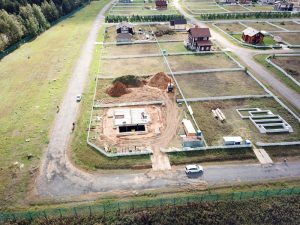Navigating the complex landscape of compulsory acquisition in NSW can be daunting, especially when one's valuable property is at stake. Sydney, in particular, has witnessed a surge in such cases, throwing many property owners into a whirlwind of legalities and uncertainties. Enter FM Legal, your Sydney-based guide and specialist, aiming to demystify this intricate process. Within this article, you'll uncover a comprehensive repository of knowledge — from the nuances of the Land Acquisition and Compensation Act to in-depth insights on compulsory acquisition projects dotting Sydney's skyline.
Let our expertise steer you, not just through the legal maze, but also in leveraging your rights and options. As the city grows and evolves, so does its need for land and infrastructure projects. This evolution, unfortunately, can lead to properties being earmarked for compulsory acquisition in NSW. But rest assured, with the right information at your fingertips and FM Legal by your side, you'll be well-equipped to face any challenges that come your way.


The intricacies of Compulsory Acquisition in New South Wales carry a deep resonance, particularly within the bustling hubs of compulsory acquisition Sydney. Rooted in history, this process is a balancing act between public development and individual property rights. Understanding compulsory acquisition meaning is essential: it's the government's power to obtain private property for public utility.
Sydney's surging growth necessitates compulsory acquisition more than ever. Such scenarios can be overwhelming, but that’s where FM Legal steps in.
At FM Legal, we've transformed the narrative for countless clients facing compulsory land acquisition. As the torchbearers in this realm, we champion not just for rightful compensation, but also for justice and transparency. Our commitment runs so deep that many clients benefit from our expertise without a dent in their pockets.
Whether you're facing a compulsory land acquisition or need an easement lawyer, our expertise stems from a deep understanding of compulsory acquisition case law. We know the battles and victories, and we're here to guide you through it all. Remember, when the stakes are high, having an experienced acquisition lawyer by your side makes all the difference.

The world of compulsory acquisition delves deeper than just legal jargon; it encompasses a profound change that can significantly alter the trajectories of property and business owners. Enshrined in the Land Acquisition (Just Terms Compensation) Act 1991, compulsory acquisition lays out the stringent protocols the Government must adhere to when looking to acquire private property. Moreover, the act provides a structured pathway to address and resolve any disputes surrounding rightful compensation.
For homeowners, the implications are both emotional and logistical. Beyond the tangible aspect of relinquishing a property, there's the heartfelt pain of leaving behind a home imbued with memories. The subsequent quest to locate a new home, one that aligns with a family's needs and lifestyle, can be quite taxing.
For business owners, the stakes are similarly high. Compulsory acquisition means more than just changing an address; it heralds potential operational disruptions and the challenge of re-establishing client connections. Additionally, businesses operating from these properties might find themselves entangled in complex civil matters, necessitating the expertise of a civil disputes lawyer.
This is where FM Legal shines. As seasoned land acquisition lawyers, our expertise is vast, covering not only the intricacies of compulsory acquisition but also delving into specific areas such as the NSW electricity easement acquisition guide. Whether it's broad land acquisition issues or specialised easement matters, our team ensures robust representation for both tenants and landowners.
From the Government's perspective, compulsory acquisition isn't a whimsical choice. It's a strategic measure, whether it's to bolster infrastructure, ensure balanced urban growth, or facilitate open spaces acquisitions. While it might seem an unsettling ordeal for the affected individuals, it's crucial for broader societal advancement.
The good news? FM Legal stands as a pillar of support and expertise. Our proficiency in compulsory acquisition has been showcased in high-profile projects like the Sydney Metro in the North. We've tenaciously represented a myriad of residential and commercial property owners across CBD, North Sydney, and Crows Nest. By aligning with us, you're not just engaging with land acquisition lawyers but partnering with industry-renowned compulsory acquisition experts.

When it comes to understanding the intricacies of property rights in Sydney, we believe it's essential to examine the Land Acquisition and Compensation Act closely. This legislation plays a critical role in how property is acquired and the compensation mechanisms attached to it.
At its core, the Act outlines the parameters under which land can be 'compulsorily' acquired. This means an acquiring authority, which could be various governmental bodies, has the power to secure land even if the property owner doesn't consent. But before you get alarmed, it's crucial to understand that this isn't a power used recklessly. The Act ensures this action is regulated, and an authority can only use this power if explicitly mentioned in its governing 'special act'. Sometimes, the acquisition requires additional consent from ministerial bodies or the Governor in Council.
But what happens when land is acquired? What about the owners and their rights?
This is where the compensation process comes in, an integral component of the Land Acquisition and Compensation Act. If a property owner's land is acquired, they have the right to claim compensation. And we feel it's crucial for property owners to know that the Act mandates that an initial offer of compensation be made within 14 days of acquisition. If there's disagreement over the amount, there are steps in place to ensure a fair negotiation process between the authority and the claimant.
Furthermore, the offer provided is based on a reasonable valuation, ensuring that owners are compensated fairly. As property owners, it's crucial to understand your rights. If you don't concur with the offered amount, you have the right to dispute it. Engaging a land acquisition lawyer can provide invaluable insight during such disputes. Both parties, the authority and the owner, have provisions to clarify, reject, or accept offers within specified time frames.
In essence, our aim is to help you navigate the Land Acquisition and Compensation Act with clarity. It's about ensuring a balance, and safeguarding public interests while respecting individual property rights. And with this knowledge, we hope to empower and educate you, making the legal process more accessible and understandable.

Navigating the compulsory acquisition process can be daunting, especially without understanding the intricacies involved. Here's a breakdown to help you understand the journey:
Pre-Proposed acquisition notice (12 Months prior to vacating your property): Upon initial oral advice that your land is needed, an 'opening letter' arrives, usually from an acquiring authority like RMS or Transport for NSW. This letter clarifies the reason for the acquisition. While some letters suggest a 6-month negotiation period, the reality often extends up to 9 months. If you own rented property, it's paramount to seek early legal advice due to potential complexities between landowner and tenant claims.
Initial Negotiation (6 Months): Once the opening letter is received, negotiations commence. FM Legal will help you negotiate with the acquiring authority over compensation, including the market value of your land and related disturbance costs. If a mutual agreement is reached during this period, compensation is provided, and land ownership or lease transitions to the acquiring authority.
Proposed Acquisition Notice 'PAN' (6 Months prior to vacating your property): In the absence of an agreement within the initial 6 months, the “Proposed Acquisition Notice” (PAN) gets served, marking the beginning of the compulsory acquisition process. This phase requires submitting a compensation claim to the Valuer General of NSW within 60 days. It's noteworthy that the acquiring authority can issue this notice without your approval, yet negotiations can continue.
Acquisition Proceeds (3 Months till vacating your property): Should negotiations fall through, the relevant Minister signs the acquisition notice, leading to its publication in the Government Gazette. This phase, often called 'Gazettal', signifies the land's ownership transfer to the acquiring authority, initiating the compensation determination by the Valuer General of NSW.
Agreement with determination: Upon agreeing with the determined compensation, you're typically compensated within a month. However, this agreement necessitates relinquishing any future claims by signing a Deed of Release and Indemnity.
Disagreement with determination: If the determined compensation isn't satisfactory, we can advise on the prospects of achieving a better outcome. While you retain the right to contest the decision in the Land and Environment Court within 90 days, 90% of the determined compensation is still accessible.
Determination of compensation: Here, the appointed Valuer General, in collaboration with your lawyer and experts, finalises the compensation amount. Before the final determination, a Preliminary Determination provides insights into the expected compensation, allowing for further submissions.
Issuing the Determination and Compensation Notice (45 Days till vacating your property): After the compensation determination, both you and the acquiring authority are notified. Subsequently, a compensation notice is issued, providing 90 days for acceptance. Notably, the acquiring authority cannot contest the Determination.
File Land and Environment Court Proceedings: In cases where the compensation isn't satisfactory, we file proceedings in the Land and Environment Court. Most disputes are amicably resolved during a “section 34 conference”, a settlement meeting held approximately 3 months into the court proceedings.
Legal Fees: FM Legal is committed to ensuring you're not out of pocket for legal costs. All incurred legal fees are recoverable, and if necessary, we might engage a barrister on your behalf. Our goal is to guarantee you receive the best possible outcome without the financial strain.
In the multifaceted compulsory acquisition process, our commitment remains unwavering: to stand by your side every step of the way, ensuring transparency, clarity, and the best possible outcome. We at FM Legal understand the complexities and emotional toll these processes can take, which is why we're dedicated to shouldering the legal burdens, allowing you to focus on the future.

In the realm of property rights, especially within the confines of Sydney, the right legal expertise becomes indispensable. This makes the role of Compulsory Acquisition Lawyers in Sydney crucial. Among the myriad of options available, FM Legal has marked its distinct presence, primarily due to its robust expertise in compulsory acquisition cases. So, why choose FM Legal?
In conclusion, making an informed choice when it comes to legal representation is paramount. With FM Legal, and particularly with Flo Mitchell’s guidance, property owners can be assured of receiving comprehensive and competent support. FM Legal exemplifies what one should expect from top-tier Compulsory Acquisition Lawyers in Sydney.

Sydney, with its dynamic growth, is currently involved in several compulsory acquisition projects in Sydney. Notable projects include the Mamre Road Upgrade, the Vineyard Precinct Legal, Moruya Lawyers, and the much-anticipated Parramatta Light Rail Stage 2. Additionally, the Mulgoa Road Upgrade, M12 Upgrade, Blacktown Health Education Precinct, and the Sydney Metro West Compulsory Acquisition are reshaping parts of the city. Homeowners impacted by these transformative projects should understand their rights and the implications of these developments. At FM Legal, we've successfully represented homeowners in the West Connex Compulsory Acquisition Rozelle, securing compensations over 300% of initial offers. Similarly, our expertise shone in the Sydney Metro West Compulsory Acquisition, where we negotiated settlements for homeowners, ensuring they were justly compensated and legally protected.
To better understand the complexities and implications of compulsory acquisition, it's beneficial to refer to educational compulsory acquisition videos. These resources can offer deeper insights into various facets of the process. While we're in the process of curating a comprehensive video collection for our readers, here are some topics that will be explored:

When it comes to land acquisition, it's essential to comprehend its nuances, especially in the context of Australian property dealings. Both land acquisition and compulsory acquisition aim to procure land for specific purposes, whether initiated by government agencies, private developers, or individuals. However, their approaches differ:
Similarities:
Differences:
Significance: Land acquisition, as a voluntary method, is generally preferred due to its non-disruptive nature. It provides an avenue for governments and private entities to source land for essential projects without potential confrontations. However, there are situations, particularly critical infrastructure developments, where compulsory acquisition becomes the chosen path.
Recent Trends: A noticeable trend in recent years is the increasing preference of governments towards compulsory acquisition, especially for affordable housing schemes. This shift is primarily driven by escalating housing prices and the acute shortage of affordable living spaces in various cities. FM Legal has the expertise to navigate the complexities of both land acquisition and compulsory acquisition. With our guidance, clients are ensured a seamless and just process, irrespective of their unique circumstances.

The resumption of land is an intricate process wherein the government exercises its right to compulsorily acquire private land to serve public purposes. Whether it's for developing infrastructure like roads and railways, erecting community structures, protecting our environment, or ensuring land for schools and hospitals, this mechanism ensures that the government can adequately address community needs. However, it's imperative to note:
While the resumption of land is beneficial for community development, it can indeed be overwhelming for homeowners. Having knowledgeable legal support in these situations can drastically change the outcome. Flo Mitchell and her team are reputed for their prowess in representing clients in such cases, ensuring they receive rightful compensation and understand the process thoroughly.
The Open Spaces Program is a testament to the government's commitment to fostering community well-being. With an impressive $50 million investment, New South Wales is set to see a surge in public spaces that resonate with recreation, nature, and community activities. The objective is two-fold:
Open Space acquisitions are transforming the Sydney region, with local Councils at the forefront of these changes. Our team, under the leadership of Flo Mitchell, has represented numerous homeowners against councils like Cumberland, Auburn, and Blacktown. With a proven track record of handling claims ranging from modest figures to a staggering $18m, Flo has continually demonstrated her expertise in these matters. Her success stories include negotiating settlements that are significantly higher than initial offers, with some exceeding 300% of the original compensation proposed.

Tracing its roots to British common law, compulsory acquisition law empowered the Crown to secure land for the public, guaranteeing fair compensation. This authority was later enshrined in the constitution of Australian colonies and eventually, the states.
In 1858, New South Wales saw its inaugural compulsory acquisition legislation. Initially straightforward, it underwent a significant revamp in 1914 with the Land Acquisition Act's introduction, laying out a comprehensive, equitable system for acquisition. This Act remains the touchstone for compulsory acquisition law in the region.
The evolution of this law mirrored Sydney's socio-economic metamorphosis. With the city's rapid growth, the demand for land surged, necessitating:
Despite the undeniable significance of compulsory acquisition law, the journey can be intricate and taxing for landowners. Nevertheless, the law has their back, offering several protective rights. To navigate this labyrinth, expert guidance is crucial.
That’s where we, FM Legal, step in. Known for our prowess in Sydney, we’ve consistently clinched favourable outcomes for our clients, often negotiating settlements that far exceed initial offers. For anyone confronting the intricacies of compulsory acquisition, having FM Legal on their side ensures they're not just represented, but championed.
Navigating the complexities of compulsory acquisition law becomes less daunting with FM Legal at your side. As Sydney experiences rapid transformations, land and property rights are paramount. With our renowned expertise and dedication to our clients, you gain more than just legal advice; you get a steadfast partner. Should you face challenges in property negotiations or acquisition intricacies, engage FM Legal's unmatched guidance. We're committed to safeguarding your rights and illuminating the path forward.
If you have a question get in touch with our team.